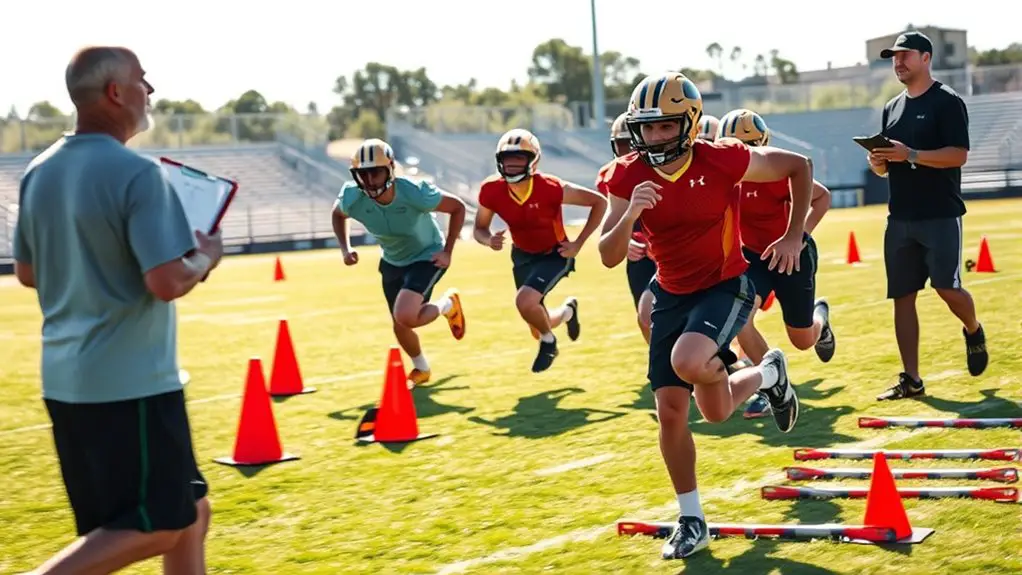To run a faster 5K race, you need a solid training plan that includes varied runs, proper nutrition focusing on whole foods, and effective interval training like sprints and hills. Master your race-day strategy by pacing yourself and familiarizing with the course. Analyze your performance during the race to adjust as needed. With these strategies in place, you'll set yourself up for success and discover even more tips to elevate your running game.
Establish a Solid Training Plan
When it comes to running a faster 5K, having a solid training plan is essential for success. You'll want to outline your goals, assess your current fitness level, and structure your training around those insights. Start by determining how many days a week you can commit to running and include a mix of easy runs, long runs, and rest days. This balance allows your body to recover while building endurance. Don't forget to listen to your body—if you're feeling fatigued, it's okay to adjust your plan. Embrace the freedom of customizing your training to suit your lifestyle. With dedication and the right plan, you'll be well on your way to achieving that faster 5K time you've been dreaming of.
Incorporate Interval Training
To truly enhance your 5K performance, incorporating interval training into your routine can make a significant difference. This method boosts your speed and endurance while keeping things fresh and exciting. Here's how you can effectively integrate intervals:
- Short sprints: Alternate between fast-paced running and recovery jogs.
- Hill workouts: Run uphill for added resistance, then recover downhill.
- Track sessions: Use a track for structured intervals, like 400m sprints.
- Fartlek training: Mix varying speeds throughout your run based on terrain or time.
- Rest periods: Allow for adequate recovery between efforts to maximize benefits.
Focus on Proper Nutrition
While training hard is essential for improving your 5K time, focusing on proper nutrition can be just as important. You need to fuel your body with the right nutrients to maximize your performance and recovery. Prioritize whole, unprocessed foods like fruits, vegetables, lean proteins, and whole grains. Hydration is key, too; staying well-hydrated keeps your energy levels up and helps you perform at your best. Don't forget to pay attention to your pre-race meals; they should be easy to digest and rich in carbohydrates for that extra energy boost. Listening to your body's needs can guide your nutrition choices, allowing you to feel light and free as you race. Embrace this freedom through mindful eating!
Master Your Race-Day Strategy
You've fueled your body with the right nutrients, and now it's time to focus on executing your race-day strategy. Embrace the freedom of running with a plan that sets you up for success. Here are some key elements to reflect on:
Fuel your body and embrace your race-day strategy for a successful run. Plan, execute, and visualize your triumph.
- Arrive early: Give yourself time to warm up and relax before the race starts.
- Stick to your pace: Start at a controlled speed to avoid burning out too soon.
- Know the course: Familiarize yourself with the terrain, including any hills or turns.
- Stay hydrated: Drink water before and during the race, but don't overdo it.
- Visualize success: Picture yourself crossing the finish line strong and proud.
Analyze and Adjust Your Performance
As you race, it's important to monitor your performance and make real-time adjustments. Keep an eye on your pace and breathing; if you're feeling fatigued, it's okay to dial it back a bit. Listen to your body—if your legs feel heavy, shift your focus to shorter strides or pick a landmark to push through. Use the crowds for motivation; let their energy fuel your pace. If you're feeling strong, don't hesitate to pick up your speed in the final stretch. This is your race, and you've earned the freedom to adapt as needed. By being aware of your current state, you can optimize your performance and cross that finish line feeling accomplished and liberated.
Frequently Asked Questions
How Do I Choose the Right Running Shoes for a 5K?
Choosing the right running shoes starts with understanding your foot type and running style. Try on different pairs, considering comfort and support. It's crucial to find shoes that make you feel free and confident while running.
What Should I Wear on Race Day for Optimal Performance?
On race day, think of your outfit like a superhero's costume. You'll want lightweight, moisture-wicking fabrics that breathe. Don't forget a comfortable pair of socks and your favorite running shoes for peak performance!
How Can Mental Preparation Improve My Race Performance?
Mental preparation's key to releasing your potential. Visualizing success and staying positive can boost your confidence, reduce anxiety, and enhance focus. When your mind's clear, you'll find the freedom to perform at your best.
Should I Cross-Train, and if So, What Activities Are Best?
Cross-training's like adding colors to your canvas; it enhances your overall picture. Yes, you should cross-train! Activities like cycling, swimming, or yoga can boost your strength, flexibility, and endurance, freeing you to run stronger and longer.
How Do I Prevent Injuries While Training for a 5K?
To prevent injuries while training, you should listen to your body, incorporate rest days, and focus on strength training. Stretching and proper warm-ups help too, ensuring you stay free to enjoy your running journey.




